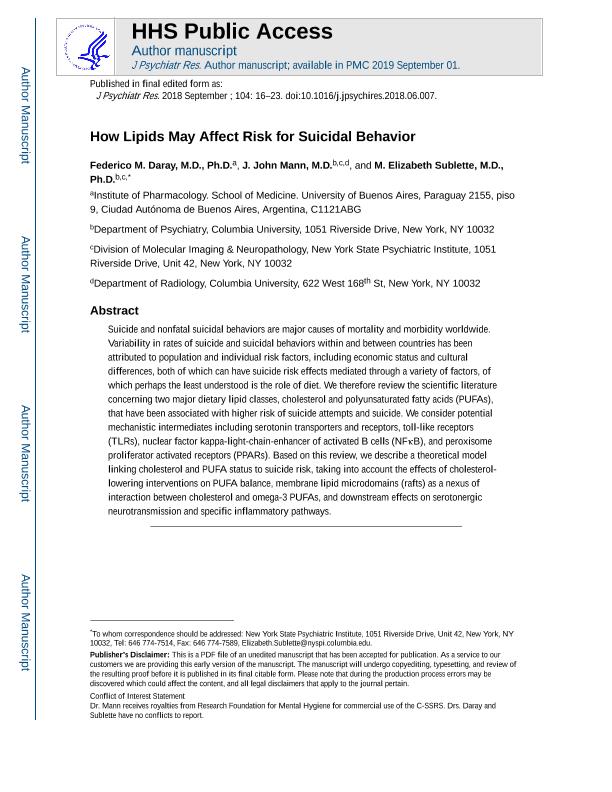Mostrar el registro sencillo del ítem
dc.contributor.author
Daray, Federico Manuel

dc.contributor.author
Mann, John

dc.contributor.author
Sublette, M. Elizabeth
dc.date.available
2020-02-20T22:22:05Z
dc.date.issued
2018-09
dc.identifier.citation
Daray, Federico Manuel; Mann, John; Sublette, M. Elizabeth; How lipids may affect risk for suicidal behavior; Pergamon-Elsevier Science Ltd; Journal of Psychiatric Research; 104; 9-2018; 16-23
dc.identifier.issn
0022-3956
dc.identifier.uri
http://hdl.handle.net/11336/98225
dc.description.abstract
Suicide and nonfatal suicidal behaviors are major causes of mortality and morbidity worldwide. Variability in rates of suicide and suicidal behaviors within and between countries has been attributed to population and individual risk factors, including economic status and cultural differences, both of which can have suicide risk effects mediated through a variety of factors, of which perhaps the least understood is the role of diet. We therefore review the scientific literature concerning two major dietary lipid classes, cholesterol and polyunsaturated fatty acids (PUFAs), that have been associated with higher risk of suicide attempts and suicide. We consider potential mechanistic intermediates including serotonin transporters and receptors, toll-like receptors (TLRs), nuclear factor kappa-light-chain-enhancer of activated B cells (NFκB), and peroxisome proliferator activated receptors (PPARs). Based on this review, we describe a theoretical model linking cholesterol and PUFA status to suicide risk, taking into account the effects of cholesterol-lowering interventions on PUFA balance, membrane lipid microdomains (rafts) as a nexus of interaction between cholesterol and omega-3 PUFAs, and downstream effects on serotonergic neurotransmission and specific inflammatory pathways.
dc.format
application/pdf
dc.language.iso
eng
dc.publisher
Pergamon-Elsevier Science Ltd

dc.rights
info:eu-repo/semantics/openAccess
dc.rights.uri
https://creativecommons.org/licenses/by-nc-nd/2.5/ar/
dc.subject
Suicide
dc.subject
PUFA
dc.subject
cholesterol
dc.subject
serotonin
dc.subject.classification
Psiquiatría

dc.subject.classification
Medicina Clínica

dc.subject.classification
CIENCIAS MÉDICAS Y DE LA SALUD

dc.title
How lipids may affect risk for suicidal behavior
dc.type
info:eu-repo/semantics/article
dc.type
info:ar-repo/semantics/artículo
dc.type
info:eu-repo/semantics/publishedVersion
dc.date.updated
2020-02-18T16:12:11Z
dc.journal.volume
104
dc.journal.pagination
16-23
dc.journal.pais
Estados Unidos

dc.description.fil
Fil: Daray, Federico Manuel. Universidad de Buenos Aires. Facultad de Medicina; Argentina. Consejo Nacional de Investigaciones Científicas y Técnicas. Oficina de Coordinación Administrativa Houssay; Argentina
dc.description.fil
Fil: Mann, John. Columbia University. Department of Psychiatry. New York State Psychiatric Institute; Estados Unidos
dc.description.fil
Fil: Sublette, M. Elizabeth. Columbia University. Department of Psychiatry. New York State Psychiatric Institute; Estados Unidos
dc.journal.title
Journal of Psychiatric Research

dc.relation.alternativeid
info:eu-repo/semantics/altIdentifier/doi/http://dx.doi.org/10.1016/j.jpsychires.2018.06.007
dc.relation.alternativeid
info:eu-repo/semantics/altIdentifier/url/https://www.ncbi.nlm.nih.gov/pmc/articles/PMC6102068/
dc.relation.alternativeid
info:eu-repo/semantics/altIdentifier/url/https://www.sciencedirect.com/science/article/pii/S0022395617312505
Archivos asociados
